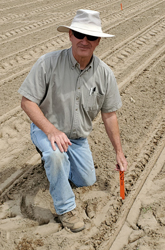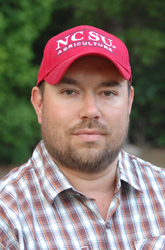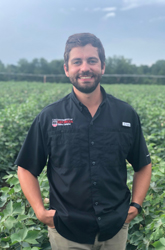 Steve M. Brown is a 1978 graduate in agronomy and soils from Auburn University and later earned MS and PhD degrees in agronomy/weed science at Auburn and Texas A&M, respectively. He worked as an assistant county agent in a cotton pest management role for a couple of years in northern Alabama and then served as a research associate in a Cotton Incorporated-funded project on no-till cotton from 1980 to 1984. From 1987 until 2008, he served as an Extension weed scientist and cotton agronomist for the University of Georgia in Tifton. He worked for a major seed and biotechnology company from 2008 until 2019, when he joined the faculty at Auburn. His entire career has focused on cotton.
Steve M. Brown is a 1978 graduate in agronomy and soils from Auburn University and later earned MS and PhD degrees in agronomy/weed science at Auburn and Texas A&M, respectively. He worked as an assistant county agent in a cotton pest management role for a couple of years in northern Alabama and then served as a research associate in a Cotton Incorporated-funded project on no-till cotton from 1980 to 1984. From 1987 until 2008, he served as an Extension weed scientist and cotton agronomist for the University of Georgia in Tifton. He worked for a major seed and biotechnology company from 2008 until 2019, when he joined the faculty at Auburn. His entire career has focused on cotton.
 Guy D. Collins began his career in 2009 as the Extension cotton agronomist at the University of Georgia after completing his PhD in crop science at North Carolina (NC) State University the same year. He earned his MS in crop science and his BS in agronomy from NC State in 2006 and 2004, respectively. Dr. Collins returned to NC State University in 2015 and served as the cotton Extension associate professor until 2020, when he was promoted to cotton Extension professor. Although his official appointment is 100% Extension, he is heavily engaged in applied agronomic research conducted on his own and collaboratively with other cotton faculty in multiple departments. In his Extension work, Dr. Collins provides assistance, support, and training programs for county agents and growers regarding cotton production and management. His research supports his Extension program by providing current information that enables cotton growers to maximize yield potential, reduce production costs, optimize timing of agronomic inputs, and employ decision aides. His current research and Extension efforts focus on large-scale, on-farm evaluations of cultivar stability across environments, plant growth regulator management, seed quality and replanting decisions, and management strategies to maximize yield and fiber quality. Dr. Collins works closely with county agents, the NC State University cotton team, the NC Cotton Producers Association, Cotton Incorporated, the Extension Cotton Specialists Working Group across the United States, and seed and crop protection companies.
Guy D. Collins began his career in 2009 as the Extension cotton agronomist at the University of Georgia after completing his PhD in crop science at North Carolina (NC) State University the same year. He earned his MS in crop science and his BS in agronomy from NC State in 2006 and 2004, respectively. Dr. Collins returned to NC State University in 2015 and served as the cotton Extension associate professor until 2020, when he was promoted to cotton Extension professor. Although his official appointment is 100% Extension, he is heavily engaged in applied agronomic research conducted on his own and collaboratively with other cotton faculty in multiple departments. In his Extension work, Dr. Collins provides assistance, support, and training programs for county agents and growers regarding cotton production and management. His research supports his Extension program by providing current information that enables cotton growers to maximize yield potential, reduce production costs, optimize timing of agronomic inputs, and employ decision aides. His current research and Extension efforts focus on large-scale, on-farm evaluations of cultivar stability across environments, plant growth regulator management, seed quality and replanting decisions, and management strategies to maximize yield and fiber quality. Dr. Collins works closely with county agents, the NC State University cotton team, the NC Cotton Producers Association, Cotton Incorporated, the Extension Cotton Specialists Working Group across the United States, and seed and crop protection companies.
 Camp Hand is an assistant professor and Extension cotton specialist at the University of Georgia in Tifton. His research and Extension programs focus on cotton agronomics in Georgia, and his goal is to work with the UGA county agents and growers to answer questions that will help Georgia growers remain sustainable and economical. Camp received his BS and MS degrees at Auburn University in horticulture while minoring in agronomy. His graduate work at Auburn was conducted under Dr. Wheeler Foshee. He then went on to pursue a PhD at the University of Georgia in Tifton in weed science under the direction of Dr. Stanley Culpepper.
Camp Hand is an assistant professor and Extension cotton specialist at the University of Georgia in Tifton. His research and Extension programs focus on cotton agronomics in Georgia, and his goal is to work with the UGA county agents and growers to answer questions that will help Georgia growers remain sustainable and economical. Camp received his BS and MS degrees at Auburn University in horticulture while minoring in agronomy. His graduate work at Auburn was conducted under Dr. Wheeler Foshee. He then went on to pursue a PhD at the University of Georgia in Tifton in weed science under the direction of Dr. Stanley Culpepper.
